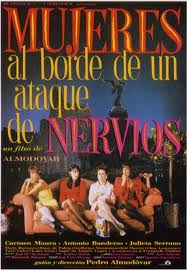The death of Spain’s fascist dictator Francisco Franco in 1975 gave rise to an alternative, adventurous and eclectic movement within Spanish culture, the movida. Next month BFI Southbank will host a season celebrating this brand of cinema with showings of Cria Cuervos (Raise Ravens, 1975) as well as Pedro Almodóvar’s Women on the Verge of a Nervous Breakdown (Mujeres al borde de un ataque de nervios, 1998),and the lesser known titles The Anchorite (El anacoreta, 1977) and Opera Prima (1980).
Good Morning Freedom! Spanish cinema after Franco at BFI Southbank
28 MayA prostitute, a lizard and a jamón serrano: A typical taste of Almodóvar
19 DecNo-one can consider themself a fan of Spanish director Pedro Almodóvar without seeing one of his most famous films, ¿Qué he hecho yo para merecer esto! or ‘What have I done to deserve this?’ Released in 1984, Almodóvar’s fourth film was his most successful to date, catapulting him onto the international film scene. It can be considered a classic while displaying all the themes and characteristics that still define Almodóvar’s work today in Volver in 2006 and Abrazos rotos in 2009.
 Almodóvar described the film as a homage to Italian neorealism, which depicts the poverty and depression of the working class in post-Second World War Italy. In this case Almodóvar depicts the economic struggles of a dysfunctional family in the outskirts of Madrid after Franco’s dictatorship.
Almodóvar described the film as a homage to Italian neorealism, which depicts the poverty and depression of the working class in post-Second World War Italy. In this case Almodóvar depicts the economic struggles of a dysfunctional family in the outskirts of Madrid after Franco’s dictatorship.
But the film is most characterised by Almodóvar’s famous love of colour and the absurd which gained currency during Spain’s transition to democracy and the cultural movement of the movida madrileña. In the 1980s Almodóvar documented Spain’s newfound freedom of expression, experimentation with recreational drugs and use of popular slang in his surreal films. His work has been compared to that of Andy Warhol and the surrealist Spanish film maker Luis Buñuel, who was a member of the daring Generación ‘27 along with Federico García Lorca. Continue reading

